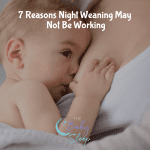
One of the questions we get asked a lot (via Facebook, emails, and phone calls), is “When can I wean my baby from nighttime feedings?” Understandably, most parents are eager to get back to enjoying nights of peaceful, uninterrupted sleep, but still want to make sure their baby isn’t going hungry.
Of course, there is no fixed schedule for night weaning. Every baby is different So every baby will be ready to wean from night feedings at different points. As we have shared in a previous post, even expert pediatricians disagree on exactly when babies are physically ready to go all night without eating.
This is one reason why we created our free night-weaning quiz, Is Your Baby Ready For Night Weaning? If you haven’t taken it before, why don’t you take it today? With only 5 questions, it’s quick! It will give you great insights into whether to not night weaning is right for your baby at this time.
Night Weaning: Baby Night Feedings By Age
There isn’t a “magical age” at which every baby is ready for night weaning. But there are some general guidelines for night feedings that seem to work for most babies:
- Newborns to 3 months old: Feedings every 2-3 hours, on demand.
- 3-4 Months: 2-3 feedings per night or every 3-6 hours, on demand.
- 5-6 Months: 1-2 night feedings.
- 7-9 Months: 1, maybe 2, night feedings.
- 10-12 Months: Sometimes one night feeding.
- 2+ Months: Generally no feedings.
Of course, growth spurts, illnesses, and teething will be factors to consider. During those times, your baby may need a feeding, even though she would not need one under normal circumstances.
Nicole’s Note:
“In our experience, formula-fed babies do tend to night-wean sooner than breastfed babies. Breast milk is digested faster than formula and is more concentrated So, baby tends not to eat as much volume of breast milk during the day. We tend to see most formula-fed babies night-wean around 6 months old. Of course, all babies are different and you know your baby best.”
3 Signs Your Baby Is Ready For Night Weaning
Guidelines are helpful, but how will you know when your baby is ready to night wean? Be on the lookout for these signs. They could be indications that your baby is ready to drop nighttime feedings:
- Your baby is not eating as much during the day. If you find that your baby is not eating as much as usual during daylight hours, but is still waking to eat one or more times during the night, that’s a good indication that it may be time to drop (or at least reduce) nighttime feedings. Encourage your baby to eat more during the day. If he can get most/all of his calories in during the day, he’ll be ready sooner to wean away from eating at night.
- Your baby is not eating much at night and treats nighttime feeds as playtime. You may start to notice that even though your baby wakes at night and cries for you, she isn’t very hungry. She might nurse a little, or drink a little of her bottle, and then be wide awake and wanting to ‘play.’ In these cases, your baby is likely waking out of habit (or due to sleep associations), and not out of hunger. This may be a sign that nighttime feedings are not really necessary and that she’s ready to drop them.
- Your baby has started solid foods. (At the appropriate time!) Disclaimer: There is a right time and a wrong time to start your baby on solid foods. For details on when to start your baby on solids, check out this post. Once your baby has started eating solid foods, it won’t be too long before he’s ready to night wean. However, your baby may continue to need 1-2 night feeds after he starts solid food. After a few months, you should be able to gradually wean him from nighttime eating. Of course, if you are breastfeeding, you’ll need to make sure you can maintain a good milk supply once you drop nighttime nursing. For details about how to measure your breastmilk supply, check out this page.
*BONUS TIP* There is a wide variance in your baby’s nighttime feeding. This one can be trickier to diagnose. But if you notice a lot of variation in when your baby wakes for night feedings, that can be a sign it is time to night wean. For instance, your baby wakes at 11 p.m. and 4 a.m. to eat one day. Then he wakes at 3 a.m. the next day. He then wakes at 10:30 p.m. and not again until morning on the third day. This variance may mean it’s time to start the night weaning process.
Keep in mind that none of these signs on their own mean that your baby is ready to night wean. For example, a 3 month old baby may have a few nights when there are big variances in the timing of her night feedings. That certainly does not mean she’s ready to stop eating at night! If you see 2-3 of these signs together, it’s a sign that you can begin the night weaning process. When helping families, we look at a large variety of factors. Then we give our professional opinion about whether it’s “time” or not.
If you feel it’s time to try, be sure to read our article, How to Wean Night Feedings, where we go over 4 ways to do it.
Still not sure whether your baby is ready for night weaning? In general, we recommend an attempt at night weaning around 8 or 9 months. There is a “chicken-and-egg” problem that some families face around this age:
“A baby needs a certain amount of sustenance during the day. If he gets some at night, he won’t eat more during the day. If he doesn’t eat more during the day, he needs it at night. So, sometimes, a baby really does feel hungry at night, but it doesn’t mean he can’t go all night without a feeding. It simply means he needs to adjust how much he’s eating during the day. The idea is to gently help him do this.” – Nicole
For more information on breastfeeding and night weaning, take a look at this article… How Weaning From Breastfeeding Can Affect Your Baby’s Sleep.








